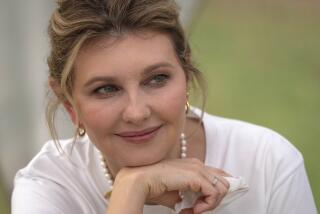Soviets Set Aside Woes, Honor Vets : Holiday: Crowds mark the anniversary of the World War II victory over Nazis.
- Share via
MOSCOW — For Yuri G. Vorobyov, his chestful of medals gleaming in the new May sun and his artificial legs propped before him on the wheelchair’s footrests, Thursday was not the day to discuss the underwear question.
From the festive crowd before the Bolshoi Theater, gathered to mark the anniversary of the Soviet victory over Nazi Germany in World War II, an elderly woman had emerged to vent her frustration at Vorobyov over her husband’s inability to buy the most essential of basics in the Soviet Union’s empty stores.
“Why can’t a veteran of the Great Fatherland War buy himself some underwear?” she shrilled. “I’m sick of all this! I’m a woman, and I need a bra. Yes, a bra!”
“Sew it yourself,” Vorobyov, a wartime scout who lost his legs to a German mine, said softly.
As for him, 72 years old, usually bedridden and already having outlived all expectations, “I can get along without underwear.”
And if the state will not provide him with the new suit he needs, well, “They can bury me in this old one. For now--” he gestured at the sun, the tulips and daffodils in his lap--”I’m content. This is a great happiness.”
It was as if, by mutual consent, the Soviet people on Thursday tried to turn their attention from all-too-familiar moaning about the trials of perestroika to focus on the unbreakable backbone that has sustained them through the bloodiest century of one of the world’s most tragic national histories.
In solemn ceremonies across the country, children presented spring flowers to the creaking, bemedaled veterans who won the war at the cost of 27 million Soviet dead. Officials marched to war monuments to pay their respects to those who fell in battle, and Leningrad Mayor Anatoly A. Sobchak called Victory Day “the most sacred day” of the year.
President Mikhail S. Gorbachev, instead of pushing for Western aid or bashing political radicals, told members of a military youth group: “In this great time of perestroika --and it’s not a simple time--we need mercy, kindness, sympathy and empathy.”
Grigory Pogrebnoy, a wartime “son of the regiment”--a child-soldier who began military scouting in the North Caucasus at age 13--said the country is urgently seeking a replacement for the deep patriotism that once seemed to dwell in everyone’s heart before the idols of communism were broken by reform.
“There was a feeling that united us--Russians, Armenians, Jews, Georgians--we were united by brotherhood and solidarity,” he said. “It’s an eternal pain to me that I don’t see people who believe in those ideals anymore.”
Standing next to Pogrebnoy, Yefim Ozeryansky, also 63 and a former child scout, countered that he was proud to represent the new patriotism, love of one’s own republic or region rather than the Soviet “empire.”
Ozeryansky, now a successful businessman in the southern republic of Georgia, said he was once such a Communist and patriot that he carried a card with him on his missions reading, “If I die, consider me a Komsomolets,” a member of the Communist Youth League.
“That’s how strongly we believed,” he said. “But now, everyone will only fight for their own home.”
In nostalgia reminiscent of American yearning for the Good War, the pre-Vietnam simplicity of good and bad guys, Ozeryansky added that, of course, it had been clear back then that the Soviet people must fight the great battle against the evil of Nazi Germany.
Now, he said, “The enemy is hidden”--politicians, in his view, who refuse to relinquish their power for the good of the country.
For Anna Kuznetsova, a 51-year-old computer programmer who comes to the Bolshoi every year for the veterans’ gathering, the old patriotism remains, only it has become something more personal, without the grandiose claims of the old days of totalitarianism.
Her eyes filled with tears as she stood near Vorobyov’s wheelchair, watching a young girl hand him flowers and thank him for his sacrifices.
“I’m ready to kiss all of these people and go down on my knees before them,” Kuznetsova said. “This country is in a terrible depression, but no matter how hard it is for us, we have pride.”
Among the day’s wrenching, bittersweet emotion, the repeated welling of tears in bright old eyes framed with wrinkles and bags, the only harsh note came from Defense Minister Dmitri T. Yazov.
In a Victory Day article in Pravda, the Communist Party daily, Yazov took an openly hard line on the dissolution of the Warsaw Pact and recent Soviet disarmament moves.
“The military-political situation in Europe is changing radically, but not in our favor,” he said.
In general, he said, “We do not seek unilateral advantages, but we shouldn’t, even for the sake of peace, disarm ourselves irresponsibly or lose vigilance and allow the repetition of June 22, 1941,” when Soviet forces were caught off guard by Germany’s blitzkrieg.
At the Bolshoi, however, talk of war always ended up turning into talk of peace.
Wartime nurse Anna Kudryasheva said all that matters is “that there be peace on our planet.”
More to Read
Sign up for Essential California
The most important California stories and recommendations in your inbox every morning.
You may occasionally receive promotional content from the Los Angeles Times.










